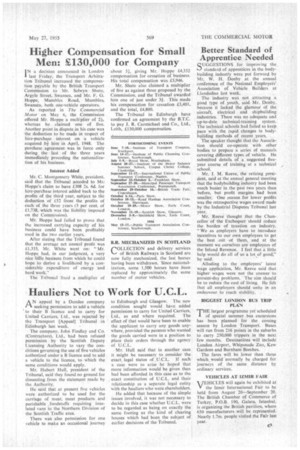Hauliers Not to Work for U.C.L.
Page 43

If you've noticed an error in this article please click here to report it so we can fix it.
ANappeal by a Dundee company seeking permission to add a vehicle to their B licence and to carry for United Carriers, Ltd., was rejected by the Transport [Appeal) Tribunal in Edinburgh last week.
The company, John Findlay and Co. (Contractors), Ltd., had been refused permission by the Scottish Deputy Licensing Authority to vary the conditions governing the use of five vehicles authorized under a B licence and to add a vehicle to the licence, to which the same conditions would apply.
Mr. Hubert Huff, president of the Tribunal, said they found no ground for dissenting from the statement made by the Authority.
He said that at present five vehicles were authorized to be used for the carriage of meat. meat products and perishable _foodstuffs requiring insulated vans in the Northern Division of the Scottish Traffic area.
There was also permission for one vehicle to make an occasional journey to Edinburgh and Glasgow. The new condition sought would have added permission to carry for United Carriers, Ltd., as and where required. The effect of that would have been to enable the applicant to carry any goods anywhere, provided the persons who wanted the goods carried were in a position to place their orders through the agency of U.C.L.
Mr. Hull said that in another case it might be necessary to consider the exact, legal status of ,U.C.L. If such a case were to arise he hoped that more information would be given than had been afforded in this case as to the exact constitution of U.C.L. and their relationahip as a separate legal entity with the hauliers who were shareholders.
He added that because of the simple issues involved, it was not necessary to decide in this case whether U.C.L. were to be regarded as being on exactly the same footing as the kind of clearing houses which had been the subject of earlier decisions of the Tribunal.








































































































